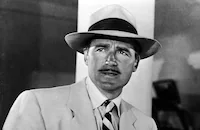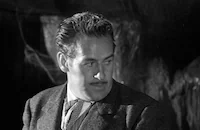Band of Angels

Brief Synopsis
Cast & Crew
Raoul Walsh
Clark Gable
Yvonne De Carlo
Sidney Poitier
Efrem Zimbalist Jr.
Patric Knowles
Film Details
Technical Specs

Synopsis
In antebellum Kentucky, the beautiful Amantha "Manty" Starr arrives home from finishing school in Cincinnati just after the death of her father, kindly plantation owner Aaron Starr. During the funeral, it is revealed that Manty's mother, who had died years before, was one of Starr's slaves and that Manty, now considered chattel of the estate, is to be sold by a slave trader to whom Starr had been deeply in debt. At a slave auction in New Orleans, a wealthy gentleman named Hamish Bond pays a huge sum for Manty, intending to treat her as a lady in his household. Because she assumes she is to be a kept woman, however, she rebuffs his offer of friendship. Michele, the head housekeeper, who is herself in love with Hamish, secretly gives Manty a ticket to Cincinnati, but Rau-Ru, an educated slave who helps Hamish manage his business affairs, prevents Manty from boarding the boat. Later Hamish confesses that he is tormented by his past, and Manty, who now sees another side of Hamish, kisses him. The next morning, Hamish takes Manty to his largest plantation and offers to free her. She hesitates but decides to remain with Hamish. Soon afterward, Hamish learns that war has been declared. While he visits another of his plantations, Manty accepts the attentions of his wealthy white neighbor, Charles de Marigny, which leads Rau-Ru to accuse her of betraying her people by attempting to live as a white woman. When de Marigny attacks Manty, however, Rau-Ru strikes him, and subsequently is forced to run away to the North. There he becomes a Union soldier under the command of Seth Parton, a self-righteous minister who had courted Manty when she was at finishing school. Hamish returns to the plantation and, in defiance of Union general Benjamin Butler's order, sets his own crops ablaze in order to keep them out of Yankee hands. As his fields burn, Hamish confesses to Manty that in his younger days, he had been a ruthless slave trader. With some reluctance, Manty leaves Hamish to begin a new life in New Orleans, and there she encounters Parton, who threatens to tell her new sweetheart, Ethan Sears, that she is black unless she makes love to him. Horrified, Manty returns to Hamish's New Orleans home, where she learns that he is on the run for burning his crops. Rau-Ru, who despises Hamish for having treated him with kindness, which he calls, "the worst kind of bondage," discovers where his old master is hiding and holds him at gunpoint. When Hamish tells Rau-Ru that he rescued him from a slave trader's bullet when he was an infant, however, Rau-Ru decides to let Hamish go. At that moment, Union troops arrive and Rau-Ru, while loudly proclaiming that he has captured Hamish, quietly slips his former owner the handcuff keys. Hamish escapes from the Union soldiers as Rau-Ru leads Manty to the cove where Hamish plans to rendezvous with an old seafaring friend. Bidding farewell to Rau-Ru, Hamish and Manty embrace and then board the boat that will take them to safety.

Director

Raoul Walsh
Cast

Clark Gable

Yvonne De Carlo

Sidney Poitier

Efrem Zimbalist Jr.

Patric Knowles
Rex Reason

Torin Thatcher

Andrea King

Ray Teal
Russ Evans
Caroline Drake
Raymond Bailey

Tommie Moore
William Forrest
Zelda Cleaver
Joe Narcisse
Marshall Bradford
Noreen Corcoran

Juanita Moore
Jack Williams
Charles Heard

Roy Barcroft
Curtis Hamilton
Riza Royce
Mayo Loizeaux
June-ellen Anthony
Carla Merry
Jim Hayward
William Fawcett
Jean G. Harvey
Alfred Meissner

Dan White
Guy Wilkerson
Larry Blake
Ewing Mitchell
Forbes Murray
Joe Gilbert

Robert Carson
Robert Clarke
Maurice Marsac
Jeanine Grandel
Gizelle D'arc
Harry Fleer

Bob Steele
Zon Murray
Morgan Shaan
X Brands
Paul Mcguire
Martin Smith
William Hughes
Myron Cook
Charles Victor
Pete Dunn
William Hudson

Ann Doran
Walter Smith
Carl Harbaugh
William Schallert
Charles Horvath
Anthony Ghazlo
Robyn Faire
Ann Staunton
Milas Clark Jr.
Madame Sul-te-wan
Crew
Gusti Adler
Al Alleborn
Franz Bachelin
Lucien Ballard
Gordon Bau
Marjorie Best
Folmar Blangsted
Murray Cutter
Ivan Goff
Lester Hairston
Gene Marks
George Reid
Ben Roberts
Russ Saunders
Lewis Smith
Francis Stahl
Max Steiner
John Twist
Finn Ulback
William Wallace

Videos
Movie Clip




Film Details
Technical Specs

Articles
Band of Angels
It begins in 1853 with white overseers chasing and overtaking two runaway slaves on a Kentucky plantation. It ends with Union soldiers, including former slaves, pursuing Gable's wealthy slave-owner along the edge of a Louisiana bayou following the Union capture of New Orleans in 1862. (From start to finish, a line is drawn between "good" and "bad" slave-owners, based on whether or not they beat their slaves...as if that was the issue.) The link between the Kentucky planter (William Forrest) and Gable's planter is Yvonne De Carlo's Amantha Starr, suspended between two worlds. She begins as a daughter of privilege. But when her widower father dies, she learns why her dead mother was buried behind the Kentucky mansion in which she was raised, and not in the family cemetery. Her mother was a slave, which means she's stripped of status, instantly relegated to slavery herself. After fending off the lecherous slave trader who bought her, she's sold at auction in New Orleans to Gable's Hamish Bond.
What follows is a sort of extended minuet. Unlike that lion of the boudoir, Rhett Butler, Hamish Bond is all gentleman. Technically, she is his property, even though he surrounds her with luxury and the trappings of gentility in his New Orleans house. Eventually, they kiss in a gale, but not before he makes clear that he means to treat her with respect. Hers is the most emotionally complex character. Having lived in the white world and the black, she understandably decides that white is better. Aiming for marriage to Bond, she's eaten at by the uncompromising hatred Poitier's Rau-Ru harbors for whites. He insists the subjugation of blacks is even more pernicious when wrapped in kind treatment because it robs the blacks of the outrage that might free them. Band of Angels even has a counterpart of Gone with the Wind's house servant, Prissy - Dollie (Tommie Moore), whose chirpings stir further doubts in the conflicted Amantha.
The reason for Hamish's restraint is soon revealed. When Amantha asks him why, if he loves her, he won't propose marriage, his reply is that if she knew his secret she wouldn't want any part of him. His secret is that he was a slave trader, shuttling between Africa, the West Indies and the U.S. before he cashed out and got even richer buying land and planting cotton and sugar cane. But what's the secret? It's the most conspicuous of several weak spots in the film's structure. How could Amantha not be aware that if he were a rich landowner in the South, slavery would be an integral ingredient of his fortune? Is it supposed to matter that he was a more hands-on beneficiary of the slave trade in his younger days? Or that by treating his slaves more humanely than most, it somehow takes the sting out of his embedded position in slavery? Repeatedly, Band of Angels trips on its acceptance of slavery, never more so than when it tries to soften the cruel truths of its mere existence.
Rau-Ru, two-dimensional figure that he may be, is right. Even by the prevailing standards of 1957, the film's politics represent the very variety of racism Rau-Ru decries. Is Gable's Hamish supposed to represent some sort of tortured moral redemption? He may go through the motions of agonizing over his slave-trading ruthlessness, but he does so from the comfort of wealth derived from slavery. And only at the very end, when his world is being shot out from beneath him, does he actually get around to freeing the slaves on whose backs his fortune has been made. Like Hamish, the story wants to have it both ways. Sometimes this leads to embarrassing contortions in its efforts to make Hamish sympathetic. We're supposed to know he's a deep soul and a good guy when he journeys upriver with Amantha to one of his plantations and his slaves gather at the dock to belt out a lusty chorus of welcome. Cringe-worthy!
Max Steiner's music is alarmingly below the level of his Gone with the Wind score. To be fair, he isn't given the earlier film's kind of sweep to work with here. Worse, and perhaps most fatal, is the fact that Gable seems an exhausted travesty of Rhett Butler. Dramatically and physically, his Hamish is fatally passive. He mostly stands around, looking and sounding rugged and manly in that Gable way. But he doesn't do much, partly because there isn't much Hamish can do to extricate himself from the onus under which the film puts him. It's not only that he's not heroic, except for a few instances in which he defends Amantha's virtue, but that he hasn't much to be heroic about. If it was hoped that De Carlo would expand her dramatic range after playing the wife of Charlton Heston's Moses in The Ten Commandments (1956), it doesn't happen. The story's origins in a Southern perspective can be sensed in its caricatures of the Union side. Crude or smooth, the Yankee interlopers run a narrow gamut from slobbering thugs to pious hypocrites. The South does not rise again in the dramatically inert, urgency-deprived Band of Angels.
Director: Raoul Walsh
Screenplay: John Twist, Ivan Goff, Ben Roberts (screenplay); Robert Penn Warren (novel "Band of Angels")
Cinematography: Lucien Ballard
Art Direction: Franz Bachelin
Music: Max Steiner; Carl Sigman (uncredited)
Film Editing: Folmar Blangsted
Cast: Clark Gable (Hamish Bond), Yvonne De Carlo (Amantha Starr), Sidney Poitier (Rau-Ru), Efrem Zimbalist, Jr. (Lt. Ethan Sears), Rex Reason (Capt. Seth Parton (Union officer)), Patric Knowles (Charles de Marigny), Torin Thatcher (Capt. Canavan), Andrea King (Miss Idell), Ray Teal (Mr. Calloway), Russell Evans (Jimmee (Bond's steward)).
C-127m.
by Jay Carr

Band of Angels
Quotes
Trivia
Notes
According to Daily Variety, Warner Bros. acquired the rights to Robert Penn Warren's novel on September 13, 1955, a few months before its publication. Hollywood Reporter stated that the title, Band of Angels, "referred to the short life expectancy of freed Negros who fought with Union troops during the war," but commented that the film dealt very little with this subject. Many of the reviews criticized the film's superficial and melodramatic treatment of racial issues. A number of reviews noted discrepancies between the novel and the film. Hollywood Reporter stated that in the novel, "the story seems to have been of a girl torn between two worlds. In the picture there is only the vaguest hint of a potential romance between Miss De Carlo and Poitier....The screenwriters seem to have been held back from being more explicit in their delineation of the De Carlo-Poitier relationship." New Yorker commented, "What Mr. Warren was after in his novel was a description of Southern society when slavery was still the order of the day. What we are offered here is a spate of romantic hokum." Daily Variety predicted that the film would encounter opposition below the Mason-Dixon Line.
According to a memo dated November 14, 1956 in the file on the film in the MPAA/PCA Collection at the AMPAS Library, the story as originally presented to the PCA was "an unacceptable treatment of illicit sex between the leading characters" because of their master-slave relationship. A certificate of approval was granted only after the scenes containing illicit sex were removed. Location shooting took place near Baton Rouge, LA, on the banks of the Mississippi River, and on two antebellum plantations. A packet boat more than one hundred years old was also used in the film, according to an August 1957 BHC item.

Miscellaneous Notes
Released in United States Summer August 1957
Released in United States Summer August 1957













